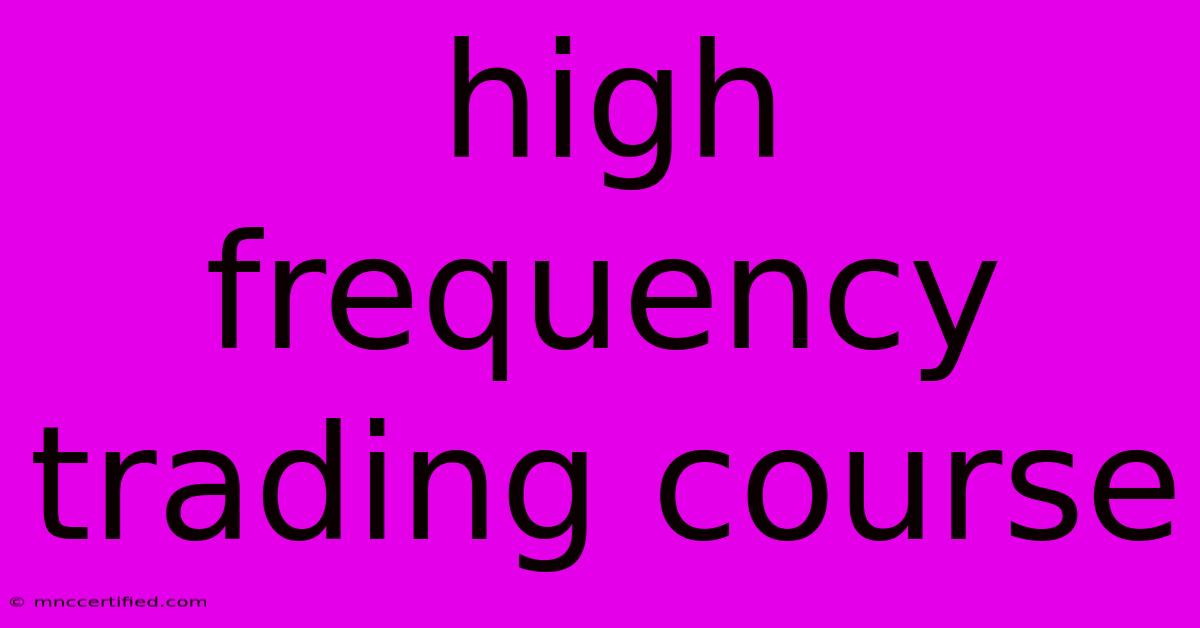High Frequency Trading Course

Table of Contents
High-Frequency Trading (HFT) Course: A Comprehensive Guide to Mastering Algorithmic Trading
The world of finance is rapidly evolving, with high-frequency trading (HFT) at the forefront of this transformation. If you're interested in learning the intricacies of HFT and building a successful career in algorithmic trading, then a comprehensive high-frequency trading course is essential. This article serves as your guide to navigating the landscape of HFT education, outlining what to look for in a quality course and providing insights into the key concepts you'll need to master.
What is High-Frequency Trading (HFT)?
High-frequency trading (HFT) is a type of algorithmic trading characterized by extremely rapid order execution. HFT firms use sophisticated computer programs to analyze market data, identify fleeting opportunities, and execute trades at speeds measured in microseconds. This involves leveraging advanced technologies, including co-location, low-latency networks, and powerful trading algorithms. The goal is to profit from minuscule price discrepancies and market inefficiencies, often executing thousands or even millions of trades per day.
Key HFT Concepts Covered in a Comprehensive Course:
A robust high-frequency trading course should cover a wide range of crucial topics, including:
- Algorithmic Trading Strategies: Understanding various HFT strategies, such as market making, arbitrage, and statistical arbitrage, is critical. Courses should delve into the mathematical models and logic behind these strategies.
- Order Book Dynamics: A deep understanding of how order books work is crucial for HFT success. A good course will explain order types, their impact on market liquidity, and how to interpret order book data.
- Network Latency and Co-location: Minimizing latency is paramount in HFT. Courses should discuss network infrastructure, co-location strategies, and how to optimize trading systems for speed.
- Data Acquisition and Processing: Efficiently gathering, cleaning, and processing vast amounts of market data is essential. A strong course will cover data sources, data cleaning techniques, and real-time data streaming.
- Risk Management: HFT involves significant risks. Courses should teach sophisticated risk management techniques, including position sizing, stop-loss orders, and stress testing.
- Programming and Software Development: Proficiency in programming languages like C++, Python, or Java is essential. A comprehensive course should incorporate practical programming exercises and projects.
- Regulatory Compliance: Understanding the regulatory landscape surrounding HFT is critical. Courses should cover relevant regulations and compliance procedures.
Choosing the Right High-Frequency Trading Course: Key Considerations
The quality of your high-frequency trading course significantly impacts your success. Look for these characteristics:
- Experienced Instructors: The instructors should possess significant experience in HFT, ideally with a proven track record in the field.
- Practical Application: The course should offer hands-on experience through simulations, projects, or access to a trading platform. Theoretical knowledge alone isn't enough.
- Comprehensive Curriculum: Ensure the curriculum covers all the key concepts mentioned above. A superficial overview won't suffice for mastering HFT.
- Community and Support: A strong community of students and instructors provides valuable networking opportunities and ongoing support.
- Industry Relevance: The course material should reflect current trends and best practices in the HFT industry.
Beyond the Course: Building a Successful HFT Career
A high-frequency trading course is just the first step. Continuous learning and development are crucial for success in this dynamic field. Here are some additional steps:
- Networking: Attend industry conferences and events to network with professionals in the field.
- Stay Updated: The HFT landscape is constantly changing, so stay informed about the latest technologies and regulations.
- Develop Your Skills: Continuously improve your programming, data analysis, and trading strategy development skills.
- Practice: Develop and test your own trading strategies using simulated trading environments.
Mastering high-frequency trading requires dedication, hard work, and a deep understanding of the underlying principles. By choosing the right high-frequency trading course and consistently developing your skills, you can significantly increase your chances of success in this exciting and challenging field. Remember to always research thoroughly and choose a course that aligns with your specific learning style and goals.

Thank you for visiting our website wich cover about High Frequency Trading Course. We hope the information provided has been useful to you. Feel free to contact us if you have any questions or need further assistance. See you next time and dont miss to bookmark.
Featured Posts
-
Palms Insurance El Paso Texas
Nov 29, 2024
-
Farage Announces Jenkyns Reform Uk Move
Nov 29, 2024
-
Anderson Intl Trading Website
Nov 29, 2024
-
Pay Insurance Lapse Online Md
Nov 29, 2024
-
Is Nvdl Etf A Good Investment
Nov 29, 2024